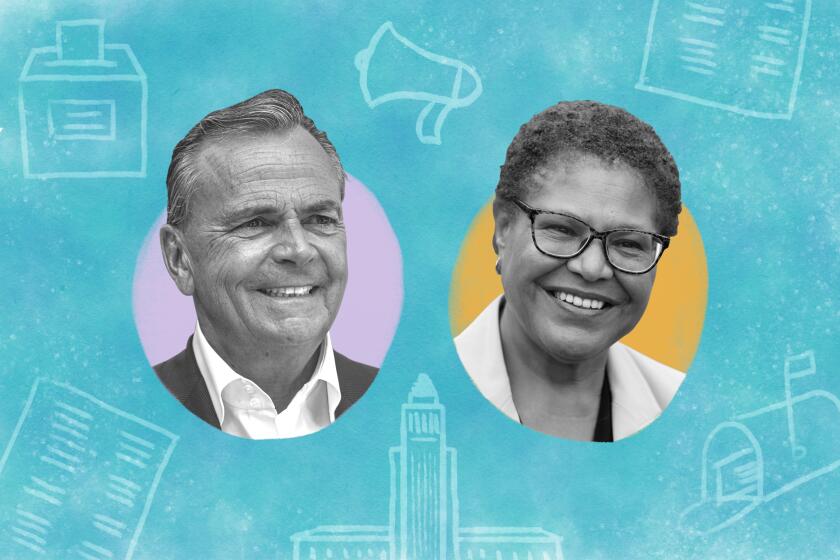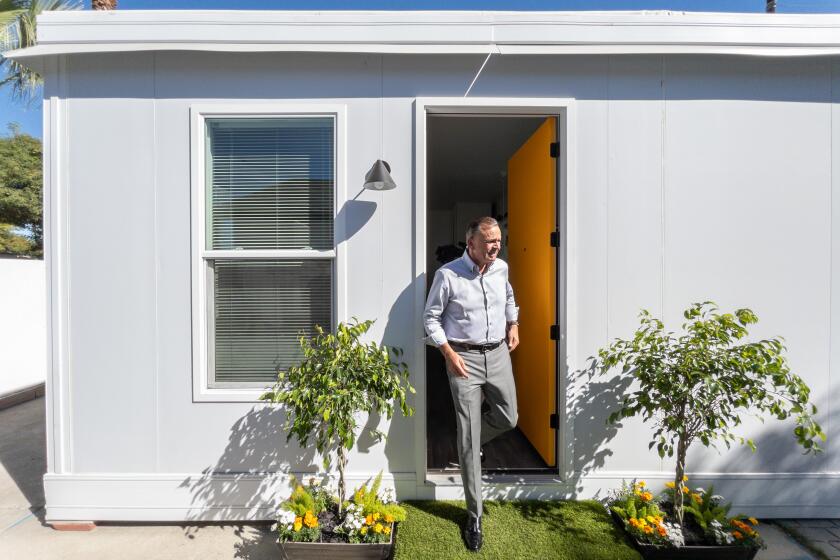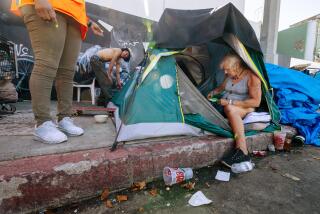Column: A skid row response to mayoral homeless promises: Bring not words, but deeds and truth
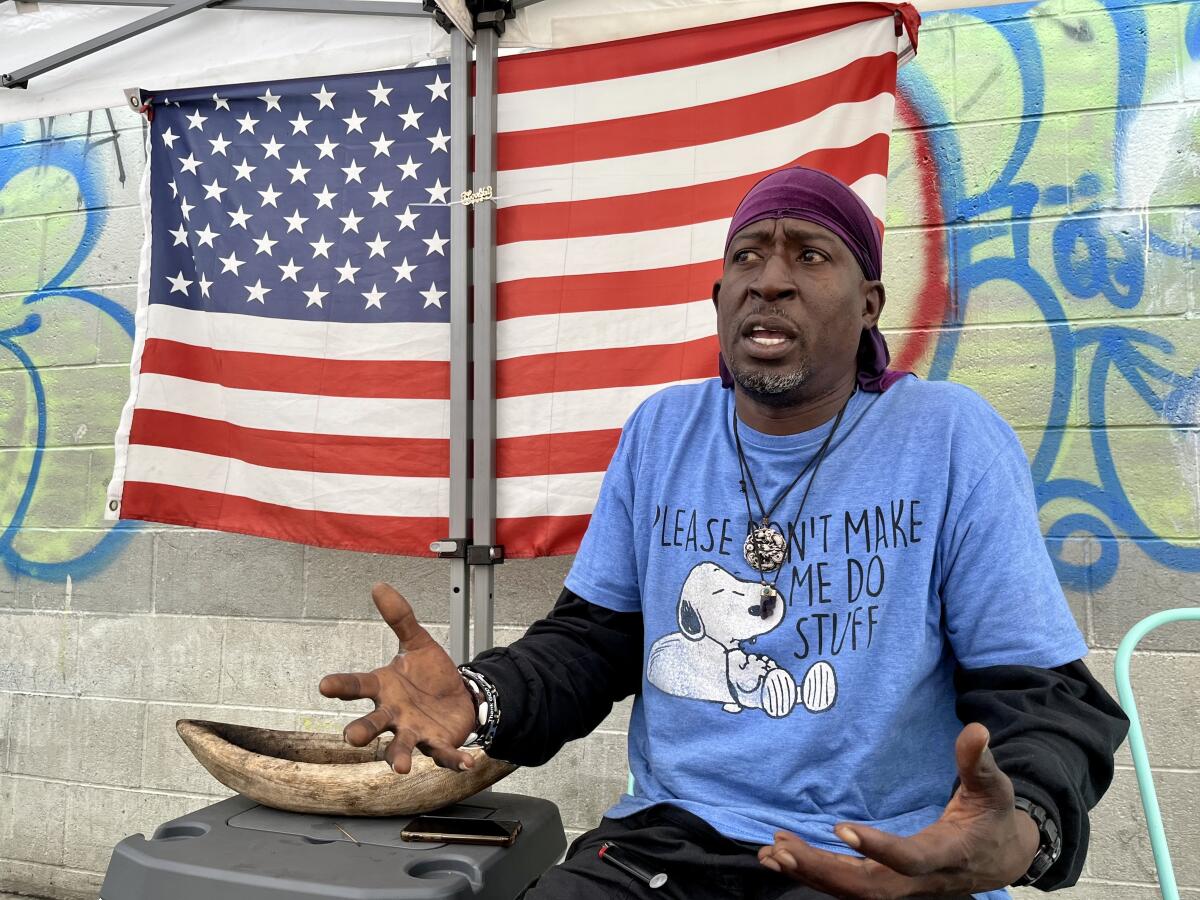
- Share via
One night on skid row, many years ago, I asked a homeless person if he’d seen a guy pushing a violin and cello around in a shopping cart. I told him I’d hooked up with a nonprofit that was trying to get my musician friend into an apartment.
The man was skeptical. The ones pushing shopping carts aren’t usually ready to move inside, he told me.
That might have been a generalization, but in the case of my friend Nathaniel, he was right.
Along with a distrust of strangers and an aversion to new surroundings, Nathaniel’s reasoning was that the cart, which contained all his belongings, wouldn’t be allowed in an apartment building. A psychiatrist explained to me that a cart and its carefully stored belongings can represent order, balance and control. None of which would be easily surrendered.
This experience comes to mind when I hear the two candidates for mayor of Los Angeles, Rick Caruso and Karen Bass, make promises that are almost certainly beyond reach. Caruso says he’ll house 30,000 people in 300 days; the Bass number is 17,000 in 365 days. For perspective, an ambitious, all-hands-on-deck plan to house 15,000 people at the height of the pandemic fell well short of its goal.
Rick Caruso and Karen Bass are running for Los Angeles mayor. Here is your guide to the race.
Interestingly, I keep seeing my name in a Caruso ad saying that I called the Bass plan “underwhelming.” That was 10 months ago, before Caruso entered the race. At the time, candidates were big on promises and short on details and innovation, and I wrote, “don’t over-promise, don’t under-deliver.” Just a few days from election day, that plea applies far more to Caruso than to Bass.
In my conversations with social workers and homeless people, there’s keen awareness of the obstacles to any rapid housing plan — people won’t surrender their pets, they refuse to be split off from friends or loved ones, they don’t want to have to give up certain possessions, they’re in the clutches of the rampaging drug epidemic, they fear their new quarters will resemble a jail more than a home.
And there’s a lack of faith in big political promises.
“We hear you … but our eyes are wide open,” said Quincy Arnaz Brown, who runs a safe-haven ministry under a tent on skid row and is known as Pastor Blue.
The community sure needs a hand, he said, and wants to believe the candidates. And yet …
“Let us not love in words and in tone, but in deeds and in truth,” said Pastor Blue. “So you can talk that talk, but we’ve heard it before.”
After a long stint of homelessness, Pastor Blue moved into the cargo container village near Chinatown in August. But before that, he was one of many who turned down chances to move into a shelter setting or temporary housing. This is worth noting because Caruso’s evolving plan at one point called for putting 15,000 people into tiny homes and another 15,000 into some kind of shelter setting.
Shelters have undeniably saved a lot of lives in Los Angeles. But the curfews and other rules don’t work for a lot of people, said Pastor Blue. He told me the vast majority of the skid row residents he knows have either an addiction, a mental illness, or both. Those conditions would further complicate any massive attempt to quickly shuttle thousands of people indoors.
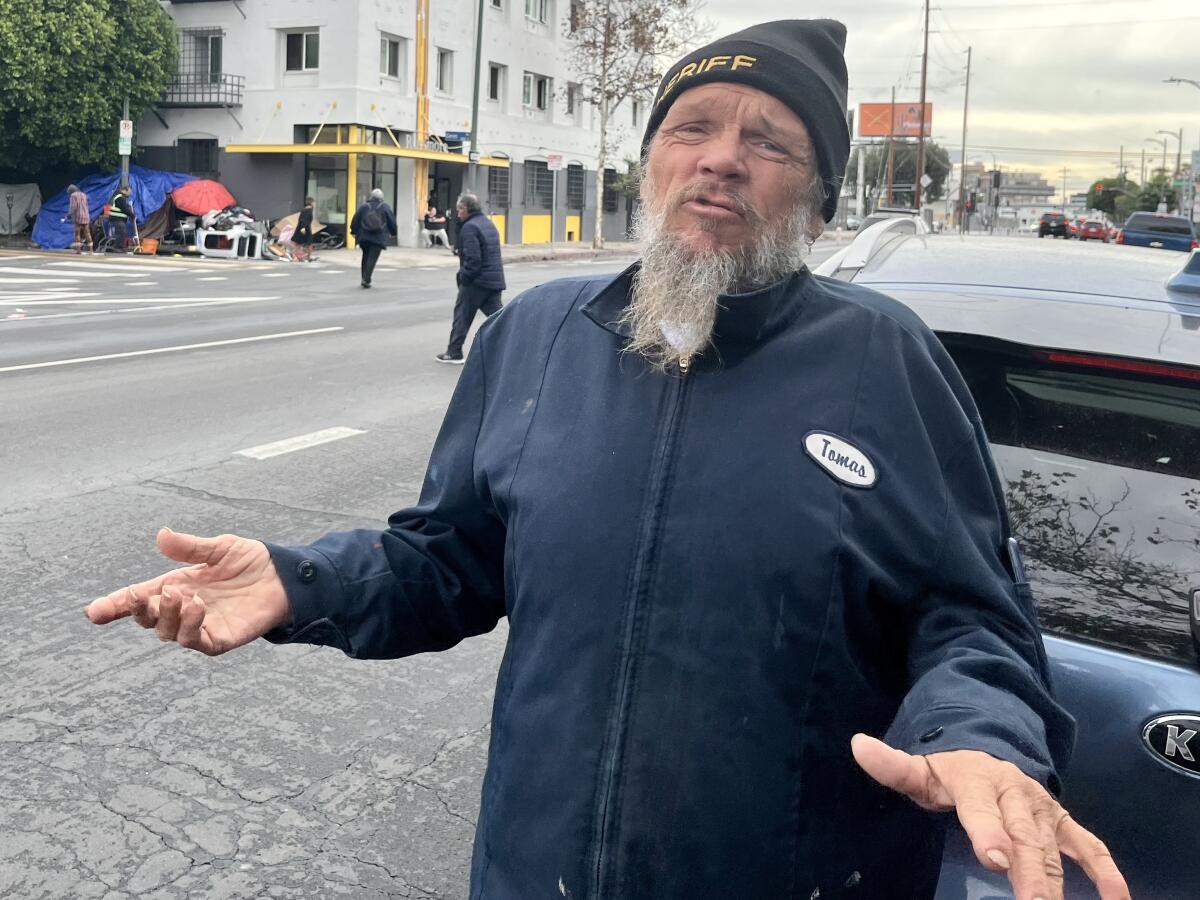
Ron Brown, who’s known as Pepper and calls himself the mayor of skid row, lives in the same Chinatown container village as Pastor Blue.
“People want to go inside, but they don’t want to go into dormitories and they don’t want to go into gyms with … a bunch of Army cots, where you have no privacy and you get no sleep,” Pepper said.
I spoke to him across from Para Los Ninos, an education and social service nonprofit that has the names of its primary donors — Caruso and his wife, Tina — on the wall outside. Pepper had told me a couple of weeks ago, in the presence of Bass, that she had his vote.
But he’s now gone to the other side, and said he already cast a ballot.
“I voted for Caruso,” said Pepper, arguing that his candidate has invested in the community for years and will continue to do so, in part by using his skills to convert abandoned and under-utilized buildings into permanent housing.
Both candidates understand that all types of housing are in short supply, from temporary to permanent. And on a bright note, Bass and Caruso have each explored modular homes and other options that cost much less than what’s in the pipeline and take less time to construct.
Is there any reason for optimism?
Yes, actually. The “mansion tax” on the city ballot would raise hundreds of millions of dollars annually for homelessness prevention and housing. And in a couple of years the new statewide CARE Court program, despite some flaws, will provide mental health treatment to those in crisis.
But even if Bass and Caruso can pull off the miracle of creating thousands of new units in a year or less, there’s much more that stands in the way of realizing their goals.
Not enough outreach workers or mental health and drug rehab services, most of which is beyond mayoral control. Not enough emergency beds for the critically ill. Not enough follow-up care to prevent the newly housed from going out the back door and returning to the streets. Not enough money to pay for it all. Not enough consensus or alignment among city, county, state and federal officials.
All of this tumbles out of the sky and lands on the desk of the new mayor on Day 1.
Heidi Marston, former director of the Los Angeles Homeless Services Authority, said one barrier to housing is that so many homeless people don’t have basic ID documents. Some progress has been made in addressing that, she said, but the next mayor would do well to ramp up the effort.
“You could build hundreds of units tomorrow, but it’s going to take four to six months to fill them,” Marston said.
“Across the board, it’s like hitting a brick wall,” she said, because people don’t have DMV IDs or Social Security and Medicare cards, which would help them get medical care and benefits that could help pay the rent.
Or keep them alive.
L.A. mayoral candidates Rick Caruso and Karen Bass say housing for homeless people and others can be high quality and much cheaper.
“There’s so much trauma in people’s lives,” said Dr. Susan Partovi, a street medic with years of experience. She has kept a log of her most medically vulnerable patients and has lost far too many of them. “You can die, you can get incarcerated. So much can go wrong when you’re waiting for housing.”
Dr. Coley King of the Venice Family Clinic is another street medic I’ve spent time with, and he offers a reminder that homelessness is not just a local problem — for years, socio-economic forces have wrought destruction across the U.S. But L.A. is certainly an epicenter.
We need more attention to the mental and physical health of people on the street, King said, and a more consistent system for shepherding them toward recovery with teams of medical clinicians and outreach workers.
“They need better pay, more respect, support and better morale,” he said, telling me the work is hard and the stakes are life and death. “We need more units top to bottom, across the system. That might be a detox bed, all the way to owning a permanent apartment with some transitional solutions along the way.”
There’s already been a lot of good work, King said.
“I’m not displeased with the direction of the effort,” he said. “I’m displeased with the coordination and the consistency.”
So yes, by all means, let’s move with greater urgency, focused as Pastor Blue says on deeds rather than words. But let’s not underestimate the complexities of a challenge decades in the making.
It took a full year of work, by me and a team of professionals, to earn the trust of the man with the violin and cello and persuade him to move inside.
Seventeen years later, he’s still under a roof, as are the violin and cello, and he awakes each day to what he calls the music of the gods.
More to Read
Sign up for Essential California
The most important California stories and recommendations in your inbox every morning.
You may occasionally receive promotional content from the Los Angeles Times.

